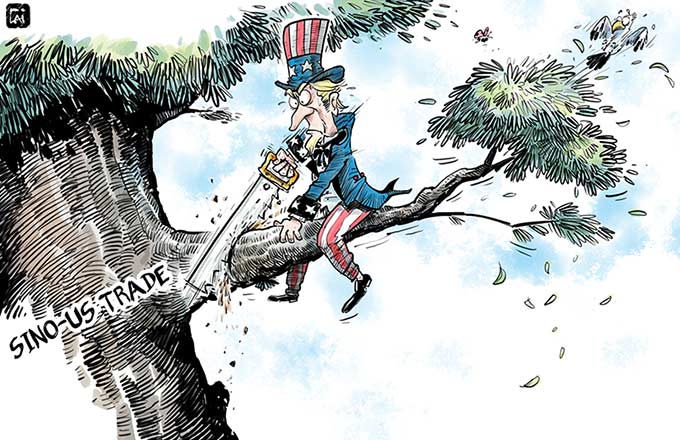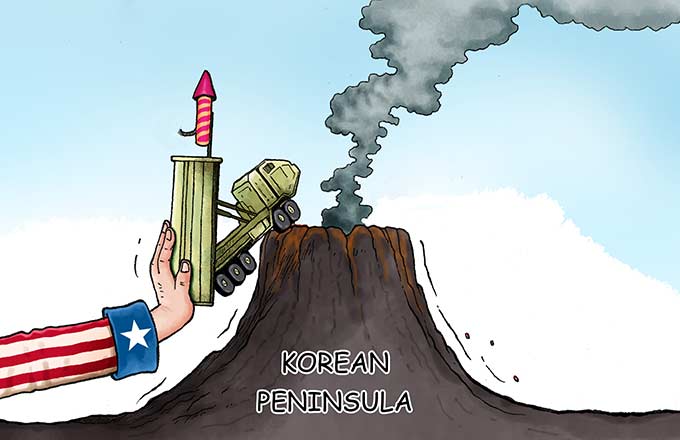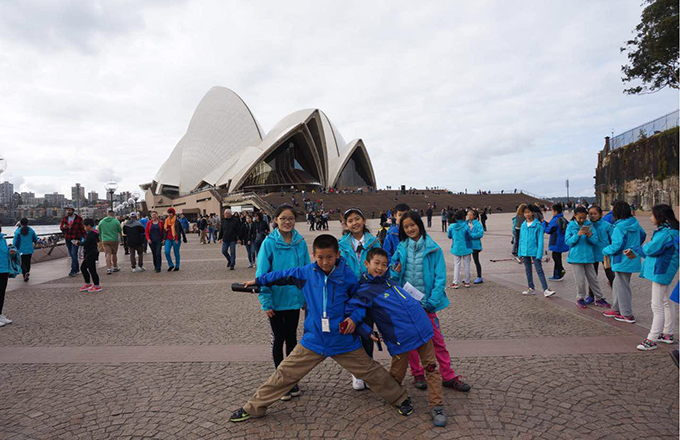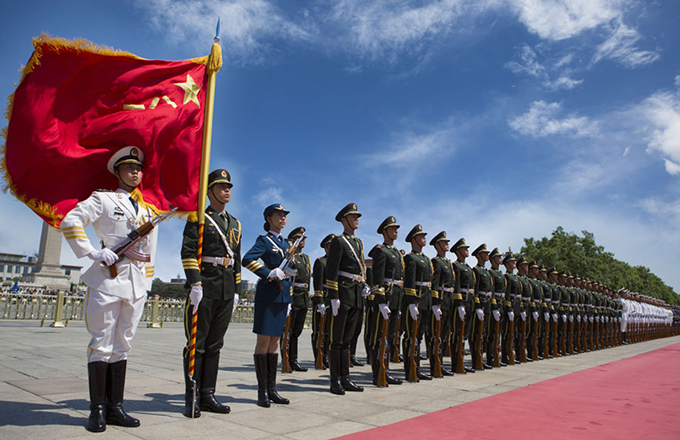Hambantota Port deal opens up a new era for China- Sri Lanka cooperation
This year marks the 60th anniversary of the establishment of diplomatic relations between China and Sri Lanka. Over the past 60 years, China - Sri Lanka relations have withstood the test of international change and maintained the healthy and stable development.
Since the end of Sri Lanka's 30-year-long civil war against the Liberation Tigers of Tamil Eelam (LTTE) in 2009, the Chinese government and the Chinese people have continued to lend a helping hand to provide a large number of concessional low interest rate loans and investments for Sri Lanka's infrastructure.
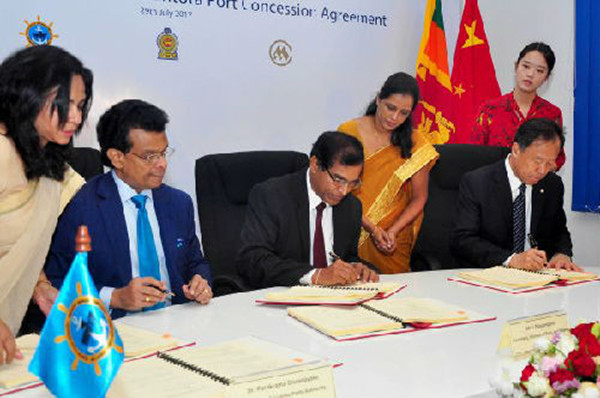 |
|
A photo taken on July 29, 2017 shows the signing ceremony on lease of Sri Lanka's deep-sea port of Hambantota to China Merchants Port Holdings. [Photo: Xinhua] |
On May 16, 2017 during the meeting with Sri Lankan Prime Minister, Ranil Wickremesinghe, who attended the two-day Belt and Road Forum for International Cooperation held on May 14-15 in Beijing, President Xi Jinping said, "It's a long-term and strategic choice for China to maintain its friendly policies toward Sri Lanka." Wickremesinghe said, "Sri Lanka is willing to make joint efforts with China to push forward smooth development of the Hambantota harbor project and the Colombo Port City project."
On July 29, 2017 Sri Lanka signed a long-delayed US$1.5 billion deal to lease its deep-sea port of Hambantota to China Merchants Port Holdings (CMPort). Under the agreement, CMPort, Sri Lanka Ports Authority (SLPA), the Sri Lanka government, Hambantota International Port Group (Private) and Hambantota International Port Services Company (Private) agreed on the terms of a 99-year concession agreement in relation to the development, management and commercial operations of the Chinese-built Hambantota Port.
On 25 July, Sri Lanka's cabinet approved the revised 99-year lease agreement with China on Hambantota Port, describing it as "a win-win situation for both countries." Regarding the agreement, Sri Lanka's Ports and Shipping Minister Mahinda Samarasinghe said, "China Merchants Port Holdings will manage the operations of the port. The port will not be allowed to become a base for any foreign navy." So, it is clear that the deal had given Sri Lanka a better deal without implications on security.
It is expected Hambantota Port, a deep-water port located on the south coast of Sri Lanka, will play a key role in China's Belt and Road initiative, given its proximity to South Asia and East Africa and its position as a hub port in the region.
Surely, the agreement will be beneficial for Sri Lanka's 20 million people, injecting new vitality into the strategic cooperative partnership in various fields between the two countries. It is believed that the deal to develop the Hambantota Port will boost Sri Lanka's foreign-exchange reserves. It is encouraging to see that the Chinese investors have shown great interest in establishing cement, iron industries and refineries using the latest technology in and around Hambantota.
According to the deal, the Chinese firm CMPort will hold a 70 percent stake, with Sri Lanka's firm SLPA holding the remaining 30 percent stake. The CMPort will invest up to US$1.12 billion in Hambantota Port, which sits close to busy east-west shipping lanes and a nearby Sri Lanka-China Logistics and Industrial Zone.
Hambantota has the potential to grow into a logistic and economic hub. China has spent almost US$2 billion so far on Hambantota and the adjacent Mattala Rajapaksa airport and wants to spend much more in order to improve socio-economic development of Sri Lanka and improving the livelihood of its people.
The Chinese Embassy in Sri Lanka recently helped open a vocational training center near the airport. China's ambassador to Sri Lanka, Yi Xianliang, said that China would invest $5bn more in the next three to five years to create 100,000 jobs "if everything goes well."
However, the Hambantota Port deal had been delayed by several months with Sri Lanka's domestic pushback and also fierce opposition from India, Japan and the United States over possible military activities by China in Hambantota port.
Japan sees China's fast progress in port development under the Belt and Road Initiative as a challenge to its influence in Asia and is trying to expand its involvement in key infrastructure projects to maintain its position. On the other hand, the US is concerned that China is gaining a foothold at the deep-sea port, which could give it a naval advantage in the Indian Ocean.
India has also been playing a crucial role in suspending the Hambantota port deal. India is often biased when viewing Chinese investment in Sri Lanka. Some Indian media accused that China would develop the Hambantota port into a naval base and criticized the project as China's "debt-trap diplomacy." India feared that China might create a military encirclement around India. But India's concerns about China's infrastructure are unnecessary as China has no military plans in Hambantota.
It should be remembered since the launch of the Belt and Road initiative four years ago by China's President Xi Jinping, the initiative always focuses on civilian projects to help developing countries, and China respects these countries' security concerns when pushing infrastructure development. The new port deal is aimed at promoting Sri Lanka's economic development. It will not be used for Chinese naval vessels.
In an op-ed that appeared in a major Chinese media outlet, it was noted that enjoying strategic and unique geographic location within South Asia as well as in the Maritime Silk Route, Sri Lanka realized that an over-reliance on India is not always a good option for presenting itself to the region and the world. The economic vitality of East Asia, flourishing global trade, and particularly China's Belt and Road initiative (BRI) all sparked in Sri Lanka a renewed interest in breaking away from the Indian umbrella and pursuing a more independent foreign policy.
It is worth mentioning that on Sino-Sri Lankan economic ties, China is the biggest trading partner of Sri Lanka, relegating the longstanding dominant India to second place. Combined import and export trade between China and Sri Lanka last year amounted to US$ 4.426 billion, as opposed to the Indo-Sri Lankan figure of US$ 4.369 billion. China had invested more than US$52 million in Sri Lanka in 2016 alone. It is expected that the proposed China - Sri Lankan Free Trade Agreement will be the "Jewel in the Crown" in the bilateral economic relationship.
In summation, China and Sri Lanka have been maintaining relationships at its strongest level at present. Sri Lanka's participation in the Belt and Road Initiative would strengthen its trading position even further. China is investing billions of dollars in infrastructure development in Sri Lanka. In addition to the Hambantota Port, China will also set up an industrial zone in Hambantota. It is hoped that the industrial zone will be an engine to drive economic development of Sri Lanka attracting investors from all parts of the world.
Rabi Sankar Bosu is the Secretary of New Horizon Radio Listeners' Club in West Bengal, India.
- China-Sri Lanka port deal helps Sri Lanka boost forex reserves, attracts more investments: Moody's
- China, Sri Lanka ink Hambantota Port deal
- Belt & Road opens new era for China-Sri Lanka cooperation
- China, Sri Lanka issue joint statement on cooperation
- China, Sri Lanka to strengthen marine cooperation



